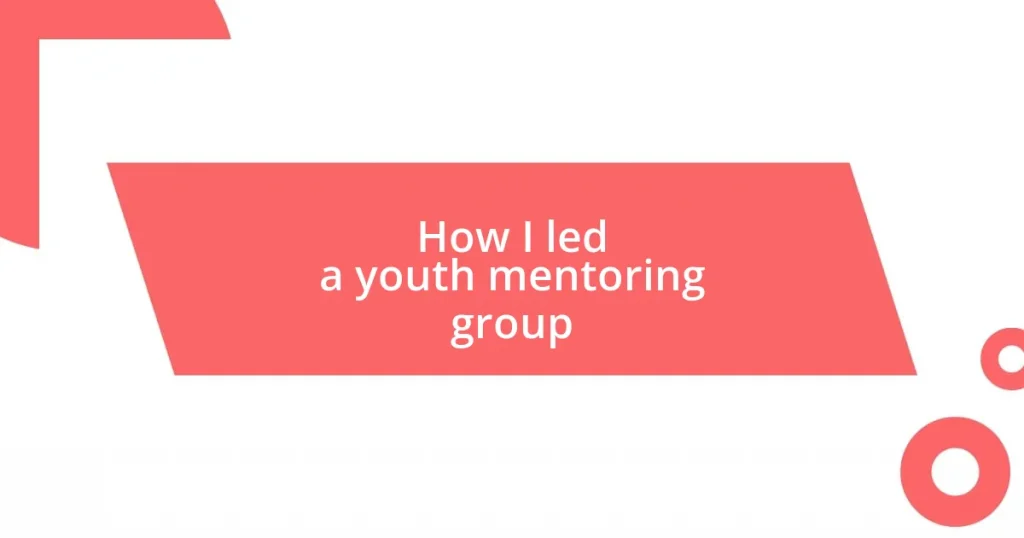Key takeaways:
- Building trust and rapport is essential; sharing personal experiences and creating a welcoming environment fosters openness among mentees.
- Active listening and open-ended questions enhance communication, allowing mentees to feel heard and express themselves more freely.
- Regular evaluations, feedback mechanisms, and self-reflection promote growth and tailor the mentoring approach to meet individual and group needs.
- Engaging social activities and individual check-ins strengthen community and encourage mentees to share aspirations and support each other’s journeys.
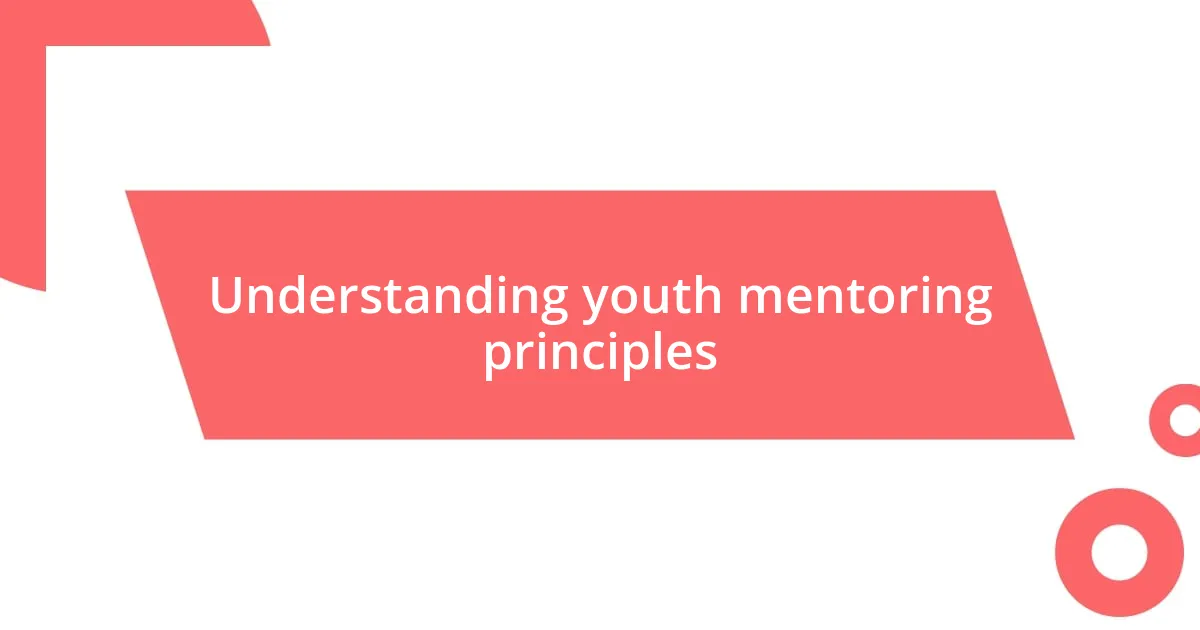
Understanding youth mentoring principles
Youth mentoring is rooted in principles that prioritize building strong, trusting relationships. I remember my first encounter with a mentee, a young girl who was hesitant to share her thoughts. I realized that creating a safe space was my top priority. How can we expect youth to open up if they don’t feel secure? Trust is the foundation on which effective mentoring is built.
Another essential principle is the idea of active listening. One day, while chatting with my mentee about her dreams, I noticed she had a lot to say but often seemed unsure if her thoughts were valid. This made me reflect on how sometimes we rush to offer solutions when, in reality, what they truly need is to be heard. Listening can uncover hidden challenges that youth face, allowing us to address their needs more effectively.
Empowering youth to set goals for themselves is equally crucial. When I encouraged my mentee to articulate her aspirations, I could see the spark in her eyes—it was transformative. Have you ever witnessed that moment when someone recognizes their potential? It’s powerful to guide youth in mapping their paths, reminding them that their dreams matter and that they are capable of achieving them.
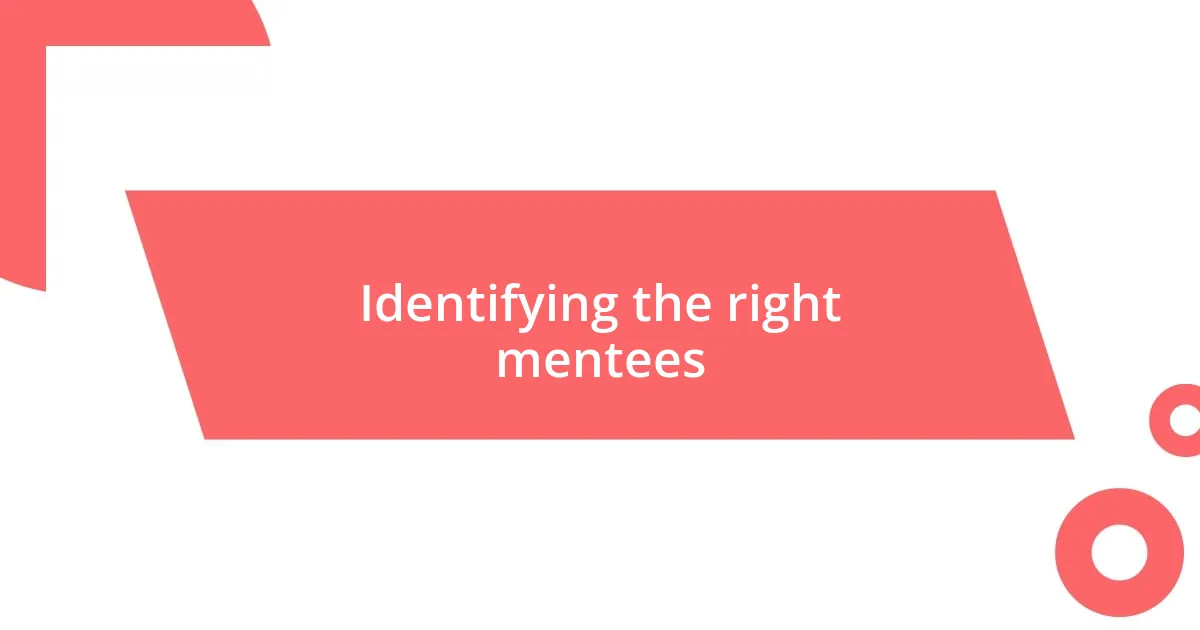
Identifying the right mentees
Identifying the right mentees is crucial for a successful mentoring experience. In my journey, I learned that it’s not just about finding willing participants; it’s about recognizing those who truly want to grow and learn. I once had a young boy approach me, showing enthusiasm but lacking direction. That moment made me realize that passion without purpose can be overwhelming. As mentors, we must look for youth who exhibit curiosity and a desire to improve themselves.
It’s also important to consider the individual circumstances of potential mentees. I remember a young girl whose challenging family situation made her unsure of her self-worth. I could see that beneath her quiet exterior lay immense potential waiting to be unlocked. I learned that by understanding each mentee’s unique situation, I could tailor my approach to their specific needs, fostering a more genuine connection. It’s this compassionate insight that creates a foundation for growth.
Additionally, I found that engaging with teachers, counselors, and parents can yield valuable recommendations. They might offer perspectives on the mentee’s character that I might not see at first glance. Once, I reached out to a high school counselor who pointed me toward a student struggling academically, yet possessing an incredible artistic talent. That recommendation led to a rewarding mentoring relationship that not only boosted the student’s confidence in academics but also ignited her passion for art. Connections and insights from others can often highlight mentees who are ready, even if they themselves don’t recognize it yet.
| Criteria | Signs of a Good Mentee |
|---|---|
| Willingness to Learn | Expresses curiosity and asks questions. |
| Unique Circumstances | Has personal challenges that could benefit from guidance. |
| Active Support Network | Recommendations from teachers or counselors. |
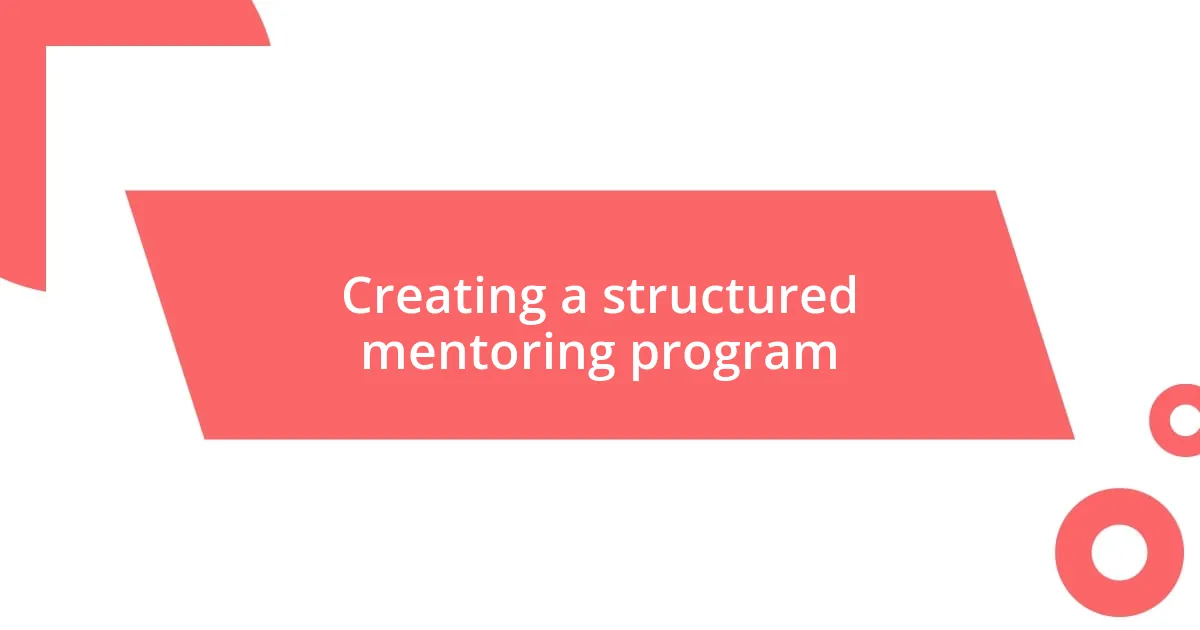
Creating a structured mentoring program
Creating a structured mentoring program involves careful planning and commitment to the needs of the participants. When I started my mentoring group, I knew I had to lay a solid framework to provide guidance and direction. It wasn’t just about matching mentors with mentees; it required developing a thoughtful curriculum. I vividly remember the brainstorming sessions where we decided on themes, activities, and goals. This preparation made us not only accountable but also gave clarity to everyone involved.
To achieve a well-structured program, consider the following elements:
- Define Objectives: Clearly outline what you want to achieve with the mentoring program.
- Establish Guidelines: Set rules for participation, communication, and confidentiality to foster trust.
- Regular Check-ins: Schedule consistent meetings to assess progress and address any concerns.
- Feedback Mechanism: Create a system for mentees and mentors to share their experiences to help refine the program.
- Resource Availability: Provide access to materials and support that can aid in mentorship, like workshops or guest speakers.
I found that implementing these elements significantly boosted the program’s effectiveness. I recall one instance where a mentee expressed feeling overwhelmed with expectations. By incorporating regular check-ins, we were able to adjust our approach, making her feel more supported and understood. It reminded me that structure doesn’t stifle creativity; it can actually enhance it.
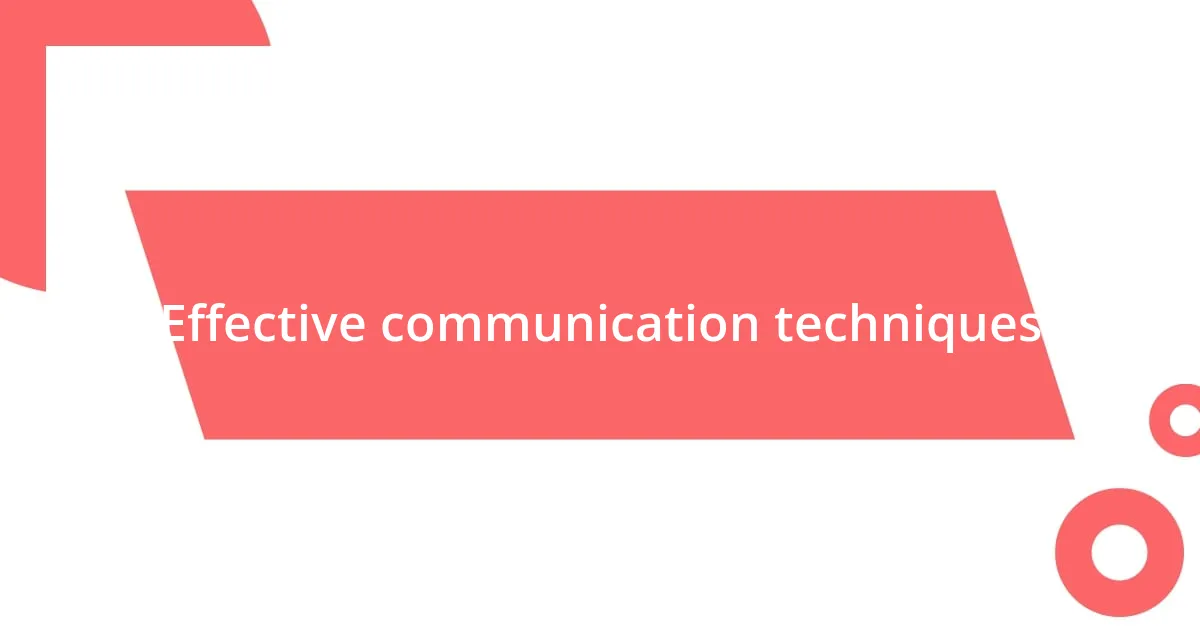
Effective communication techniques
Effective communication within a mentoring group is essential. One technique I found incredibly effective is active listening. When I first started mentoring, I often rushed to offer solutions instead of truly hearing what my mentees had to say. I remember a particular session when a young girl was sharing her thoughts about feeling lost in her academics. Instead of jumping in, I took a step back and fully engaged with her. I asked questions that prompted her to think deeper about her feelings. That small shift in approach not only made her feel heard but also encouraged her to articulate her thoughts more clearly. Have you ever noticed how much more connected you feel when someone genuinely listens?
Another vital technique is using open-ended questions. I learned this early on, and it transformed the way conversations unfolded. During one of our group discussions, I found that instead of asking, “Did you enjoy that activity?”, I would ask, “What did you like most about that activity?” This slight shift allowed my mentees to share their perspectives more freely. One of them mentioned how much she appreciated the teamwork involved, sparking a conversation about collaboration and trust. It’s amazing how a simple rephrasing can unlock deeper insights, don’t you think?
Lastly, non-verbal communication plays a significant role in expressing support and encouragement. I remember sitting with a mentee who was hesitant to share her artwork. I made sure to maintain eye contact and nod my head while she spoke. I noticed her confidence growing as she realized I was genuinely invested in her words. I think we sometimes forget that our body language can convey just as much, if not more, than our words. Have you ever felt the impact of a reassuring smile or a nod when you were hesitant? Just like that, creating an environment where mentees feel safe to express themselves can change the dynamics of the mentoring relationship.
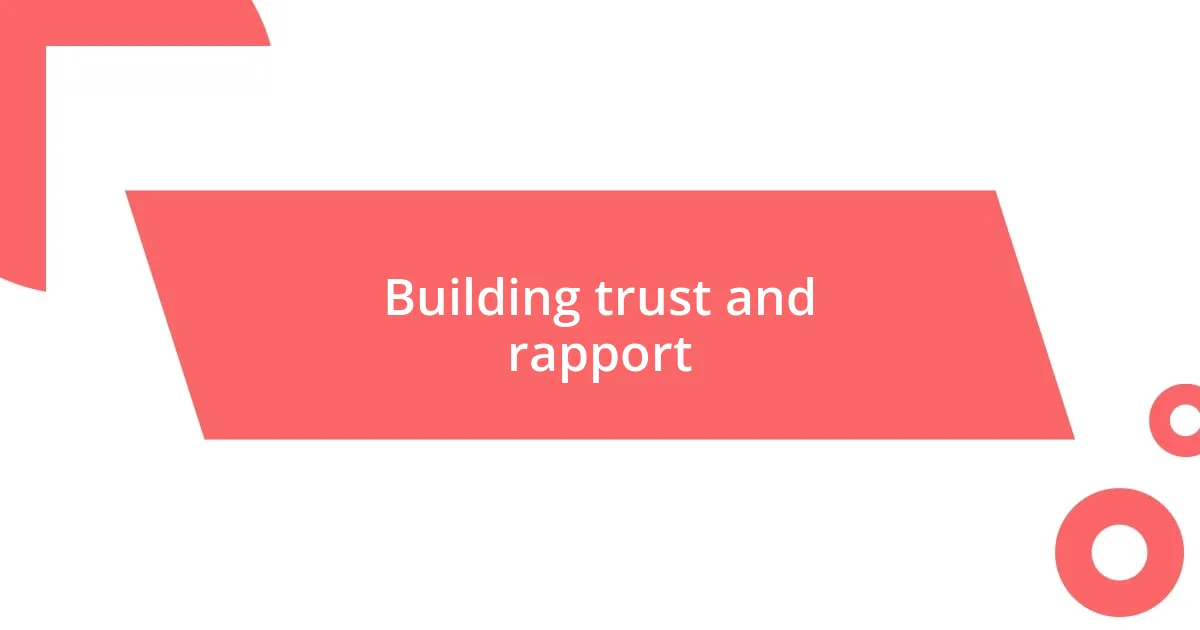
Building trust and rapport
Trust and rapport are the lifeblood of any mentoring relationship. When I first met my mentees, I understood that my approach needed to go beyond the surface. I remember our first gathering; I intentionally shared a personal story about a time I faced failure. My vulnerability opened the door for them to share their own struggles, creating an instant bond. Have you ever found that sharing your own imperfections can lead others to feel safe enough to be real with you? It’s a game changer.
Establishing a welcoming environment is crucial. I chose a casual setting for our meetings, a local café that felt relaxed and inviting. The atmosphere encouraged laughter and honest conversations. One memorable afternoon, a mentee shared her fear of public speaking, and in that moment, our group organically transformed into a collective support system. We spent the next hour practicing together, which not only gave her confidence but solidified our connections. It was a reminder that trust often grows in spaces where laughter and vulnerability intertwine. How often do we underestimate the power of a warm, comfortable space for fostering open dialogue?
Consistency is another key factor in building rapport. I made it a point to show up for my mentees, not just physically but emotionally. I recall a time when a mentee called me late one evening, feeling overwhelmed. Instead of brushing it off as just another call, I listened, assured her that her feelings were valid, and offered to meet the next day. This small act of being there when it mattered built a deep sense of trust between us. It’s moments like these that teach us that showing up consistently can mean the world to someone who feels alone in their struggles. Have you ever had someone reach out just when you needed it? That’s the type of connection I aimed to create.
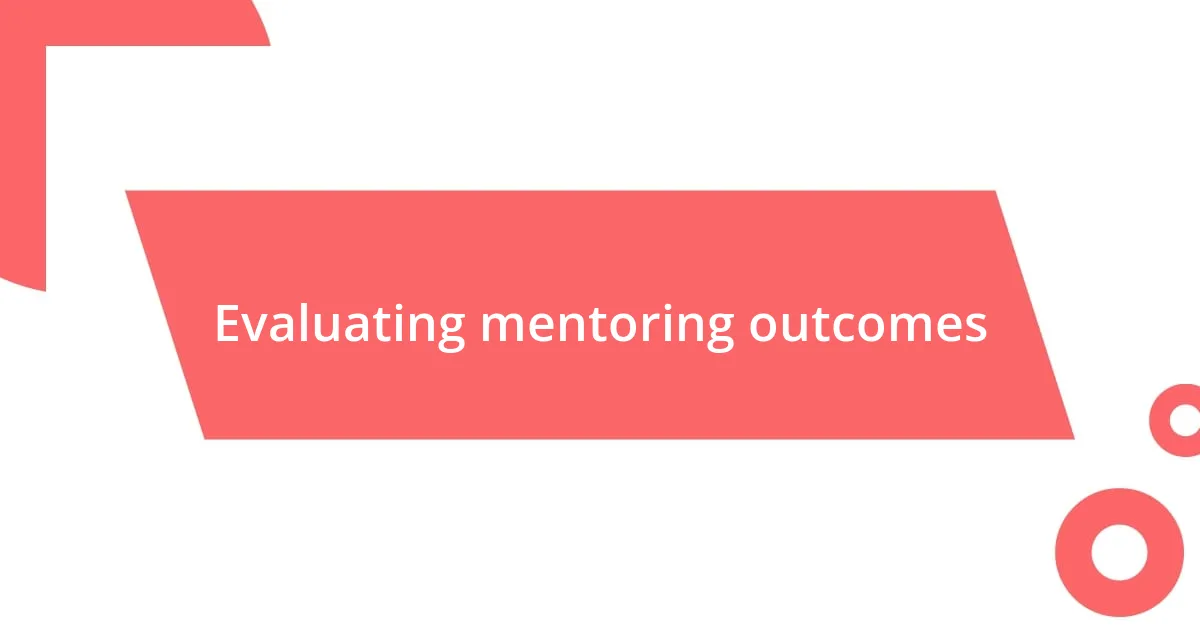
Evaluating mentoring outcomes
Evaluating the outcomes of a mentoring program is crucial for growth and improvement. I remember one particular meeting where we reflected on our goals and achievements. We gathered around a whiteboard and wrote down the skills each of us aimed to enhance. It was eye-opening to see how far we had come when we revisited those goals just a few months later. Seeing the progress in my mentees not only filled me with pride but also reinforced the importance of setting measurable objectives. Have you ever felt that rush of accomplishment when you see tangible results?
Another effective evaluation method I adopted was gathering feedback through informal check-ins. I’ve often found that spontaneous conversations reveal much more than structured surveys. One evening, while enjoying pizza after our session, I casually asked my mentees what they enjoyed the most. One of them shared that our discussions about future career paths opened her eyes to new possibilities. That feedback not only guided my future sessions but also helped me to tailor our approach to better serve the group’s needs. It’s fascinating how a relaxed atmosphere can encourage honest feedback, isn’t it?
Finally, I always emphasized the importance of self-reflection for both my mentees and myself. During one session, I led them through an introspective exercise where we discussed our learnings and challenges. By sharing my own struggles with self-doubt, I encouraged my mentees to be open about theirs. Hearing them articulate their thoughts deeply resonated with me; it reinforced the idea that growth often comes from vulnerability. Isn’t it amazing how sharing your journey can lead to collective understanding and support? This practice of reflection not only nurtured personal growth but also established an ongoing cycle of improvement for our group.
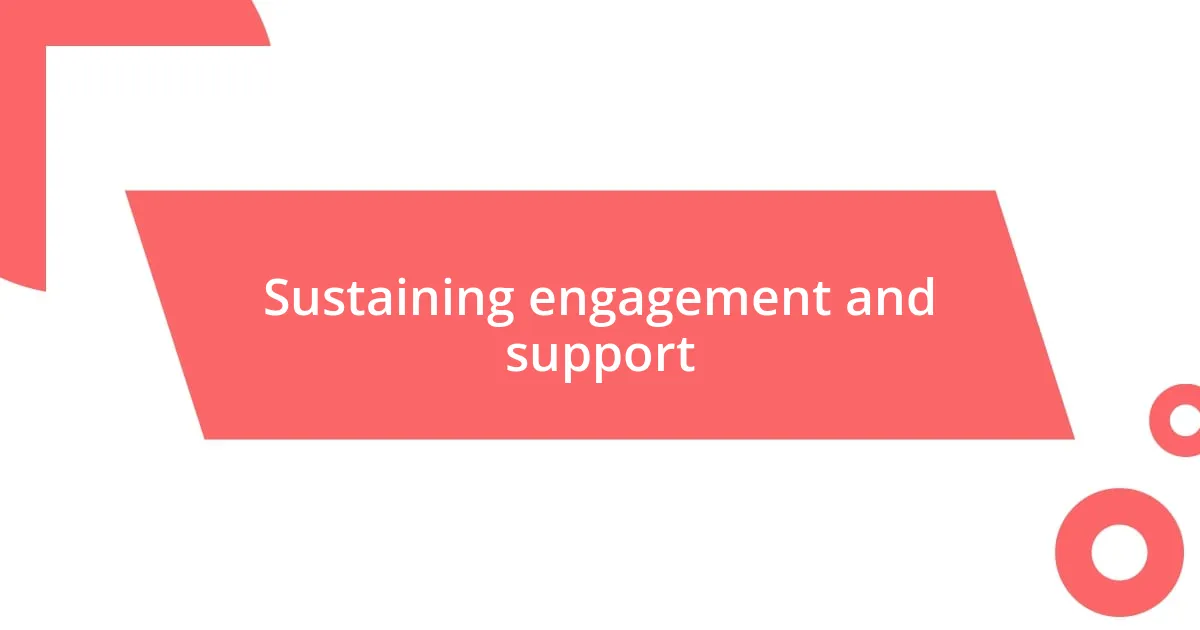
Sustaining engagement and support
To maintain engagement and support within my mentoring group, I realized that creating a sense of community was essential. One of the strategies I embraced was organizing regular social events outside our typical sessions. I vividly remember the excitement of planning a movie night, which sparked spontaneous conversations and deeper connections among the group members. Have you ever noticed how sharing a laugh or an experience outside the regular routine can significantly strengthen bonds? It truly does, and those moments of fun not only foster trust but also enhance our overall effectiveness as a support system.
I also found that incorporating individual check-ins allowed space for personal growth. Once, a quieter mentee surprised me by sharing her aspirations during a one-on-one session. She spoke about her dream of becoming a graphic designer and the fears that held her back. Listening to her passion reignited my purpose as a mentor; it reminded me that we often hold ourselves back from sharing our dreams due to fear of judgment. Doesn’t it feel liberating when someone encourages you to chase your aspirations? I made it a point to celebrate her progress, which in turn inspired others to share their own ambitions, creating a ripple effect of motivation in our group.
Lastly, I learned that fostering an environment where everyone felt valued was non-negotiable. During one meeting, I dedicated time for each mentee to express their thoughts and opinions on what they hoped to gain from our sessions. The enthusiasm in the room was palpable, as everyone shared their ideas on how we could support one another better. It struck me then; isn’t it incredible how a simple moment of acknowledgment can empower others to take ownership of their journey? I took those insights to heart and used them in planning future activities, ensuring that our approach remained flexible and responsive to their evolving needs.










